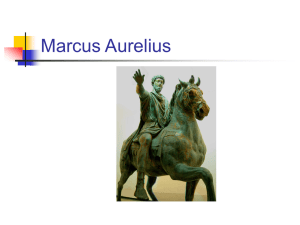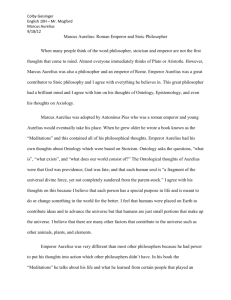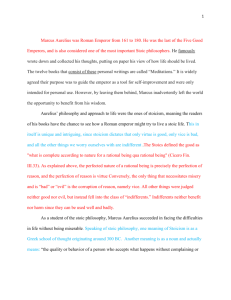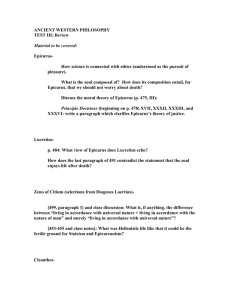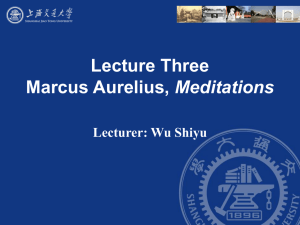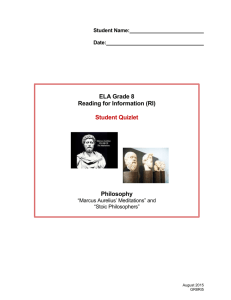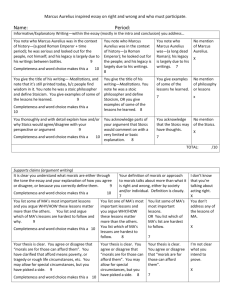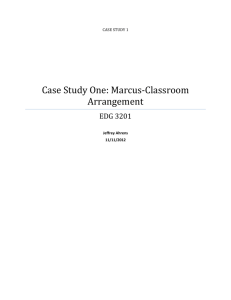English H 10th grade Marcus Aurelius Paper
advertisement
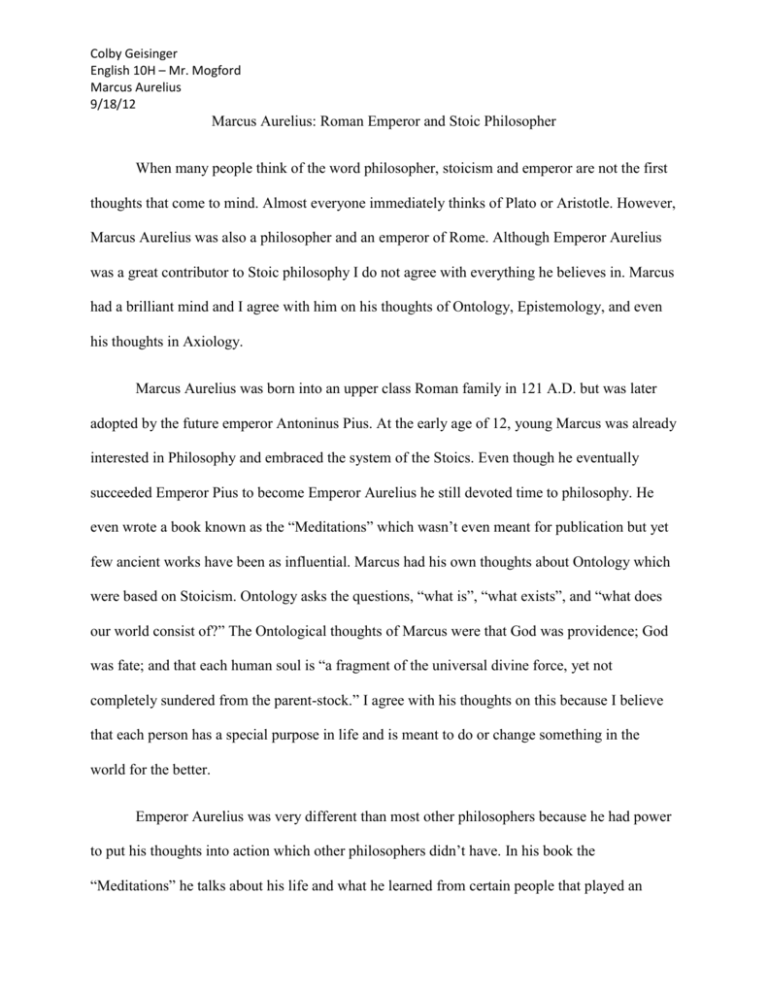
Colby Geisinger English 10H – Mr. Mogford Marcus Aurelius 9/18/12 Marcus Aurelius: Roman Emperor and Stoic Philosopher When many people think of the word philosopher, stoicism and emperor are not the first thoughts that come to mind. Almost everyone immediately thinks of Plato or Aristotle. However, Marcus Aurelius was also a philosopher and an emperor of Rome. Although Emperor Aurelius was a great contributor to Stoic philosophy I do not agree with everything he believes in. Marcus had a brilliant mind and I agree with him on his thoughts of Ontology, Epistemology, and even his thoughts in Axiology. Marcus Aurelius was born into an upper class Roman family in 121 A.D. but was later adopted by the future emperor Antoninus Pius. At the early age of 12, young Marcus was already interested in Philosophy and embraced the system of the Stoics. Even though he eventually succeeded Emperor Pius to become Emperor Aurelius he still devoted time to philosophy. He even wrote a book known as the “Meditations” which wasn’t even meant for publication but yet few ancient works have been as influential. Marcus had his own thoughts about Ontology which were based on Stoicism. Ontology asks the questions, “what is”, “what exists”, and “what does our world consist of?” The Ontological thoughts of Marcus were that God was providence; God was fate; and that each human soul is “a fragment of the universal divine force, yet not completely sundered from the parent-stock.” I agree with his thoughts on this because I believe that each person has a special purpose in life and is meant to do or change something in the world for the better. Emperor Aurelius was very different than most other philosophers because he had power to put his thoughts into action which other philosophers didn’t have. In his book the “Meditations” he talks about his life and what he learned from certain people that played an Page 2 important role in his life. “The Meditations furthered the sublime and yet personal consolation of the Stoic message and increasingly showed the strength of its rivalry to the burgeoning power of the new Christianity.” In this ancient work of his, he reveals personal thoughts and one of these are his views on Epistemology which once again is based on Stoicism. Epistemology asks, “what can we know”, “what should be taught, and studied.” The Epistemology that Marcus Aurelius believes in is that, “knowledge can be attained through the voice of reason; truth can be distinguished from fallacy.” Yet again, I agree with the Emperor’s ideas on Epistemology. I agree because through reason everything can make sense and when things begin to make sense that is when one begins to gain knowledge. I also agree because what is true is very distinct from what is misleading or false. Along with Marcus’s ideas and reflections back on his life that are found from within the “Meditations” his thoughts on Axiology are also found. Axiology ask the questions of, “what is good (ethics)”, and “what is beautiful (aesthetics).”Marcus’s views on Axiology are that, “if you assume everyone is evil, then you cannot have an imprint of evil on you and you cannot be mad at them for being evil.” Although Marcus never truly defines what he feels is evil is till agree with him. I agree with this philosopher’s thought on Axiology because in order to see everyone as evil I would first have to be completely free of all evil and sins. Marcus Aurelius had a brilliant mind and thoughts on Ontology, Axiology, and Epistemology and that is why I agree with his Stoic thinking. In my mind he is one of the greatest Philosophers throughout history. He has contributed a lot of philosophical thoughts to the world and he was able to do what many other philosophers could not do. He has contributed so much to Stoicism especially through the “Meditations.” Marcus Aurelius is a true Stoic philosopher and has changed the way of viewing the world for many including myself.

